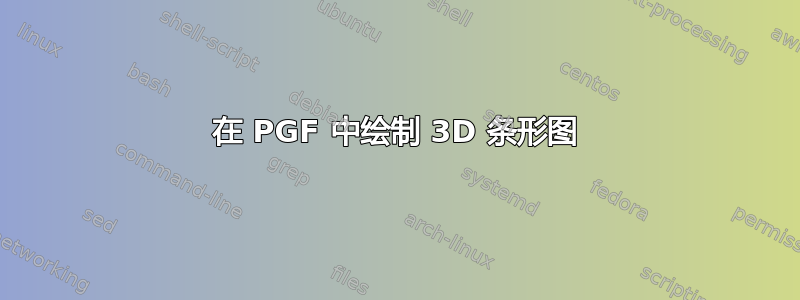
我不确定这个问题是否以前被问过,但我想制作像这个例子一样的 3D 图。
目前,我已经
\documentclass[tikz,border=3.14pt]{standalone}
\usetikzlibrary{calc}
\usepackage{pgfplots}
\usepackage{pgfplotstable}
\pgfplotsset{compat=1.16}
\begin{document}
\begin{tikzpicture}[scale=1, transform shape]
\begin{axis}[
view={120}{40},
width=10cm,
height=10cm,
grid=major,
xmin=1,xmax=4,
ymin=1,ymax=5,
zmin=-1,zmax=3,
xtick={1,2,3,4},
xticklabels={L1, L2, L3, L4},
ytick={1,2,3,4,5},
yticklabels={A, B, C, D, E},
ylabel={$y$},
xlabel={$x$},
zlabel={$z$},
axis equal,
]
\addplot3[only marks,scatter,mark=cube*,mark size=1cm, fill=blue]
coordinates {(1,1,0.7)(1,2,0.5)(1,3,0.9)(1,4,0.4)(1,5,0.33)};
\addplot3[only marks,scatter,mark=cube*,mark size=1cm, fill=orange]
coordinates {(2,1,0.6)(2,2,0.3)(2,3,0.65)(2,4,0.67)(2,5,0.31)};
\addplot3[only marks,scatter,mark=cube*,mark size=1cm,fill=violet]
coordinates {(3,1,0.3)(3,2,0.45)(3,3,0.7)(3,4,0.89)(3,5,0.45)};
\addplot3[only marks,scatter,mark=cube*,mark size=1cm,fill=red]
coordinates {(4,1,1)(4,2,0.2)(4,3,0.6)(4,4,0.72)(4,5,0.78)};
\end{axis}
\end{tikzpicture}
\end{document}
但我无法让条形图从 z=0 开始,因为它们的大小是固定的。在此先感谢所有提供帮助的人,如果我有点愚蠢,请原谅。
答案1
这重复一个老答案在情节标记方面略有新的倾向half cube*。
\documentclass[tikz,border=3.14pt]{standalone}
\usetikzlibrary{calc}
\usepackage{pgfplots}
\usepackage{pgfplotstable}
\pgfplotsset{compat=1.16}
\pgfkeys{/tikz/.cd,
cube top color/.store in=\CubeTopColor,
cube top color=blue!60,
cube front color/.store in=\CubeFrontColor,
cube front color=blue!30,
cube side color/.store in=\CubeSideColor,
cube side color=blue!40,
3d cube color/.code={\colorlet{mycolor}{#1}%
\tikzset{cube top color=mycolor!60,cube front color=mycolor!30,%
cube side color=mycolor!40,draw=mycolor}}
}
\makeatletter
\pgfdeclareplotmark{half cube*}
{%
\pgfplots@cube@gethalf@x
\let\pgfplots@cube@halfx=\pgfmathresult
\pgfplots@cube@gethalf@y
\let\pgfplots@cube@halfy=\pgfmathresult
\pgfplots@cube@gethalf@z
\let\pgfplots@cube@halfz=\pgfmathresult
\pgfmathparse{0*\pgfplots@cube@halfz}%
\let\pgfplots@cube@topz=\pgfmathresult
\pgfmathparse{-1*\pgfplots@cube@halfz}%
\let\pgfplots@cube@bottomz=\pgfmathresult
%
\pgfplotsifaxissurfaceisforeground{0vv}{%
\pgfsetfillcolor{\CubeFrontColor}
\pgfpathmoveto{\pgfplotsqpointxyz{-\pgfplots@cube@halfx}{-\pgfplots@cube@halfy}{\pgfplots@cube@bottomz}}%
\pgfpathlineto{\pgfplotsqpointxyz{-\pgfplots@cube@halfx}{-\pgfplots@cube@halfy}{\pgfplots@cube@topz}}%
\pgfpathlineto{\pgfplotsqpointxyz{-\pgfplots@cube@halfx}{ \pgfplots@cube@halfy}{\pgfplots@cube@topz}}%
\pgfpathlineto{\pgfplotsqpointxyz{-\pgfplots@cube@halfx}{ \pgfplots@cube@halfy}{\pgfplots@cube@bottomz}}%
\pgfpathclose
\pgfusepathqfillstroke
}{%
\pgfsetfillcolor{\CubeFrontColor}
\pgfpathmoveto{\pgfplotsqpointxyz{ \pgfplots@cube@halfx}{-\pgfplots@cube@halfy}{\pgfplots@cube@bottomz}}%
\pgfpathlineto{\pgfplotsqpointxyz{ \pgfplots@cube@halfx}{-\pgfplots@cube@halfy}{\pgfplots@cube@topz}}%
\pgfpathlineto{\pgfplotsqpointxyz{ \pgfplots@cube@halfx}{ \pgfplots@cube@halfy}{\pgfplots@cube@topz}}%
\pgfpathlineto{\pgfplotsqpointxyz{ \pgfplots@cube@halfx}{ \pgfplots@cube@halfy}{\pgfplots@cube@bottomz}}%
\pgfpathclose
\pgfusepathqfillstroke
}%
\pgfplotsifaxissurfaceisforeground{v0v}{%
\pgfsetfillcolor{\CubeSideColor}
\pgfpathmoveto{\pgfplotsqpointxyz{-\pgfplots@cube@halfx}{-\pgfplots@cube@halfy}{\pgfplots@cube@bottomz}}%
\pgfpathlineto{\pgfplotsqpointxyz{-\pgfplots@cube@halfx}{-\pgfplots@cube@halfy}{\pgfplots@cube@topz}}%
\pgfpathlineto{\pgfplotsqpointxyz{ \pgfplots@cube@halfx}{-\pgfplots@cube@halfy}{\pgfplots@cube@topz}}%
\pgfpathlineto{\pgfplotsqpointxyz{ \pgfplots@cube@halfx}{-\pgfplots@cube@halfy}{\pgfplots@cube@bottomz}}%
\pgfpathclose
\pgfusepathqfillstroke
}{%
\pgfsetfillcolor{\CubeSideColor}
\pgfpathmoveto{\pgfplotsqpointxyz{-\pgfplots@cube@halfx}{ \pgfplots@cube@halfy}{\pgfplots@cube@bottomz}}%
\pgfpathlineto{\pgfplotsqpointxyz{-\pgfplots@cube@halfx}{ \pgfplots@cube@halfy}{\pgfplots@cube@topz}}%
\pgfpathlineto{\pgfplotsqpointxyz{ \pgfplots@cube@halfx}{ \pgfplots@cube@halfy}{\pgfplots@cube@topz}}%
\pgfpathlineto{\pgfplotsqpointxyz{ \pgfplots@cube@halfx}{ \pgfplots@cube@halfy}{\pgfplots@cube@bottomz}}%
\pgfpathclose
\pgfusepathqfillstroke
}%
\pgfplotsifaxissurfaceisforeground{vv0}{%
\pgfsetfillcolor{\CubeTopColor}
\pgfpathmoveto{\pgfplotsqpointxyz{-\pgfplots@cube@halfx}{-\pgfplots@cube@halfy}{\pgfplots@cube@bottomz}}%
\pgfpathlineto{\pgfplotsqpointxyz{-\pgfplots@cube@halfx}{ \pgfplots@cube@halfy}{\pgfplots@cube@bottomz}}%
\pgfpathlineto{\pgfplotsqpointxyz{ \pgfplots@cube@halfx}{ \pgfplots@cube@halfy}{\pgfplots@cube@bottomz}}%
\pgfpathlineto{\pgfplotsqpointxyz{ \pgfplots@cube@halfx}{-\pgfplots@cube@halfy}{\pgfplots@cube@bottomz}}%
\pgfpathclose
\pgfusepathqfillstroke
}{%
\pgfsetfillcolor{\CubeTopColor}
\pgfpathmoveto{\pgfplotsqpointxyz{-\pgfplots@cube@halfx}{-\pgfplots@cube@halfy}{\pgfplots@cube@topz}}%
\pgfpathlineto{\pgfplotsqpointxyz{-\pgfplots@cube@halfx}{ \pgfplots@cube@halfy}{\pgfplots@cube@topz}}%
\pgfpathlineto{\pgfplotsqpointxyz{ \pgfplots@cube@halfx}{ \pgfplots@cube@halfy}{\pgfplots@cube@topz}}%
\pgfpathlineto{\pgfplotsqpointxyz{ \pgfplots@cube@halfx}{-\pgfplots@cube@halfy}{\pgfplots@cube@topz}}%
\pgfpathclose
\pgfusepathqfillstroke
}%
}
\makeatother
\begin{document}
\begin{tikzpicture}[scale=1, transform shape]
\pgfmathsetmacro{\gconv}{63.85498}%<- you get told what you need to put here
\begin{axis}[
view={110}{20},
width=10cm,
height=10cm,
grid=major,
xmin=0,xmax=4.5,
ymin=0,ymax=5.5,
zmin=0,%zmax=1.5,
xtick={1,2,3,4},
xticklabels={L1, L2, L3, L4},
ytick={1,2,3,4,5},
yticklabels={A, B, C, D, E},
ylabel={$y$},
xlabel={$x$},
zlabel={$z$},
axis equal,
]
\path let \p1=($(axis cs:0,0,1)-(axis cs:0,0,0)$) in
\pgfextra{\pgfmathsetmacro{\conv}{2*\y1}
\ifx\gconv\conv
\typeout{z-scale\space good!}
\else
\typeout{Kindly\space consider\space setting\space the\space
prefactor\space of\space z\space to\space \conv}
\fi
};
\pgfplotsset{3d bars/.style={only marks,scatter,mark=half cube*,mark size=0.6cm,
3d cube color=#1,point meta=0,
,visualization depends on={\gconv*z \as \myz},
scatter/@pre marker code/.append style={/pgfplots/cube/size z=\myz},}}
\addplot3[3d bars=blue]
coordinates {(1,1,0.7)(1,2,0.5)(1,3,0.9)(1,4,0.4)(1,5,0.33)};
\addplot3[3d bars=orange]
coordinates {(2,1,0.6)(2,2,0.3)(2,3,0.65)(2,4,0.67)(2,5,0.31)};
\addplot3[3d bars=violet]
coordinates {(3,1,0.3)(3,2,0.45)(3,3,0.7)(3,4,0.89)(3,5,0.45)};
\addplot3[3d bars=red]
coordinates {(4,1,1)(4,2,0.2)(4,3,0.6)(4,4,0.72)(4,5,0.78)};
\end{axis}
\end{tikzpicture}
\end{document}
如果您想知道为什么条形图如此小:这是因为键axis equal。您可能不想知道为什么我没有通过将转换因子写入辅助文件并从那里恢复来使其更优雅,对吗?




